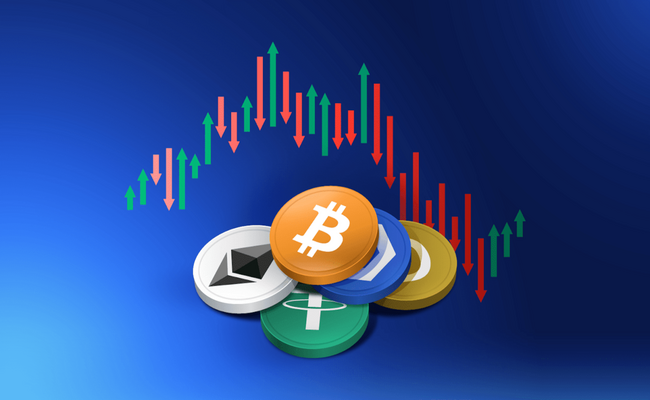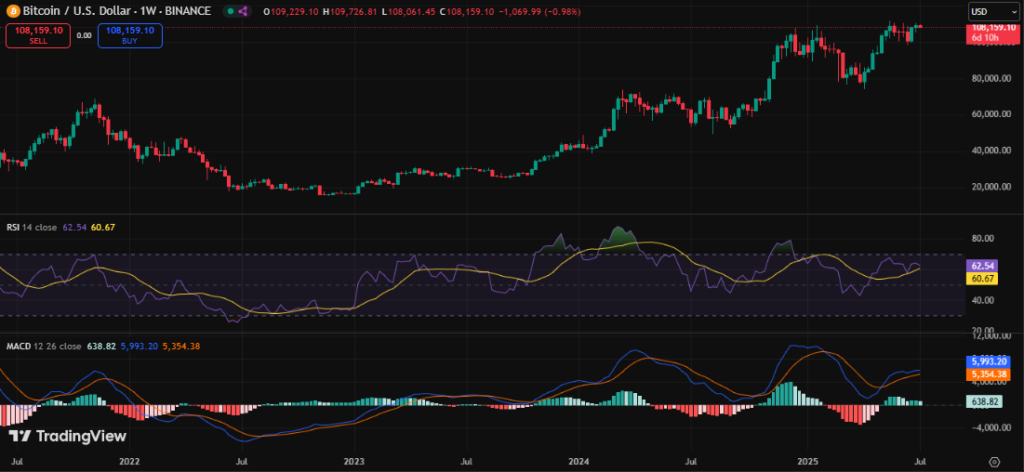Crypto Weekly Market Wrap 7th July: Trump’s Crypto Bill, Global Crackdowns, and Key Market Moves
0
0

Bitcoin saw another failed push toward a new high last week as market activity stayed relatively muted. U.S. lawmakers revealed plans for “Crypto Week,” signaling a regulatory focus while Trump signed the “Big Beautiful Bill” into law. Meanwhile, FTX faced repayment issues in 49 regions, including China, where crypto remains heavily restricted. In the section below, we will discuss this crypto weekly market wrap in deeper detail, so ensure to read up to the end to have a full grasp.
$6B Lawsuit Targets Strategy’s Bitcoin Claims
Strategy (formerly MicroStrategy) was sued in a class action by Pomerantz LLP. The case was filed in the U.S. District Court of the Eastern District of Virginia, accusing the company and its CEO, Michael Saylor, of misleading investors.
NEW: Pomerantz LLP files class action lawsuit against Strategy, alleging it misled investors about the profitability and risks of its Bitcoin investment strategy. pic.twitter.com/6IrCMRhJ15
— Bitcoin News (@BitcoinNewsCom) July 3, 2025
The complaint says that Strategy overstated the gains of its Bitcoin investments and minimized the risks of price fluctuations. Until July 15, investors who purchased Strategy shares during the period between April 30, 2024, and April 4, 2025, can become part of the class action.
The case gained traction when Strategy published a report on April 7 stating that the company had an unrealized loss of $5.91 billion in Bitcoin. The company later confirmed the losses in its Q1 report. The class action is aimed at recovering damages to affected shareholders.
Kazakhstan Drafts Blueprint for National Crypto Holdings
The National Bank of Kazakhstan is developing a new crypto initiative. The bank is considering establishing a national-held crypto reserve. The plan was revealed by National Bank Chairman Timur Suleimenov in the proceedings of addressing parliamentary queries.
Additionally, the proposed reserve may fund itself through confiscated property or government-affiliated mining. According to Suleimenov, legislation has to be built prior to implementation. He called upon legislators to work together in creating a legal framework.
Another measure the bank will take is limiting crypto product advertisements. This measure is intended to prevent the misleading of vulnerable persons with false promises. Suleimenov was especially cautious about influencers trying to sell people unattainable illusions of guaranteed profits.
President Trump Signs Sweeping Tax and Spending Bill
President Donald Trump signed a broad-based tax and spending bill on July 5. The administration labeled it the “One Big Beautiful Bill.” It corresponds to the campaigning pledges, which Trump made in his re-election campaign.
SIGNED. SEALED. DELIVERED.
President Trump’s One Big Beautiful Bill is now LAW — and the Golden Age has never felt better. pic.twitter.com/t0q2DbZLz5
— The White House (@WhiteHouse) July 4, 2025
The House passed the legislation by a margin of 218-214. Only two Republicans went alongside nearly all Democrats against the bill. According to House Speaker Mike Johnson, the bill is meant to enhance the prosperity of the nation.
Trump said he was proud of the accomplishment during a Fourth of July picnic. The Republican leaders had been working throughout the night to secure the much-needed support. The bill also contains the features of permanent tax cuts and adjustments in domestic spending.
Crypto Exchanges Embrace Tokenized Stocks on xStocks
xStocks, a tokenized stock platform by Backed Finance is getting integrated by major exchanges. The frontrunners are Kraken, Robinhood, and Gate.io. The platform provides 24/7 tokenized trading of stocks on the Solana blockchain. More than 60 United States stocks are tokenized, such as Apple and Tesla. These assets are available to non-U.S investors through DeFi apps such as Raydium.
Additionally, Kraken allows zero-commission trading as well as fractional ownership, which increases the attractiveness of the offering. In addition, the system increases the liquidity of traditional equities by incorporating decentralized finance.
Russia’s Rostec to Launch Stablecoin and Payment Platform
Rostec State Corporation launched a new digital token, RUBx, alongside a payment service by the name RT-Pay. The project is one of the components of the overall digitalization plan by Russia.
In contrast to the digital ruble issued by the Central Bank, RUBx will have its own management. It is a token that uses the Tron blockchain and is pegged 1: 1 to the real ruble. The protection of security is achieved with cold wallets and multi-stage protection systems. The goal of RT-Pay is to become a part of the banking system in Russia. Through the platform, transactions can take place on smart contracts and external wallets.
U.S. House Declares July 14–18 as “Crypto Week”
The U.S. House of Representatives declared July 14 as the beginning of the “Crypto Week”. Three critical bills will be considered by the lawmakers within this period. The effort by lawmakers seeks to cement American dominance in crypto regulation.
NEW: Chairman @RepFrenchHill, @HouseAgGOP Chairman @CongressmanGT, and House Leadership announced that the week of July 14th will be “Crypto Week,” where the CLARITY Act, Anti-CBDC Surveillance State Act, and GENIUS Act will be considered. @SpeakerJohnson @SteveScalise… pic.twitter.com/vIUoGaoSy1
— Financial Services GOP (@FinancialCmte) July 3, 2025
The CLARITY Act will place digital assets under the responsibility of both the SEC and CFTC. The Anti-CBDC Act intends to ban a United States central bank digital currency. The GENIUS Act which was recently passed will establish a regulated framework of stablecoins. This week holds the potential for new decisions that might determine the future of crypto. The outcome of bills is likely to depend on house votes.
Ethereum Foundation Alternative Launches to Drive Price Up
Ethereum Community Foundation (ECF) was proposed by Zak Cole, one of the Ethereum core developers. The group first appeared at the Ethereum Community Conference in Cannes. ECF aims to drive Ether towards the target of $10,000k.
In contrast to the Ethereum Foundation, ECF will be concerned with ETH as an asset. Cole accused the existing foundation of overlooking this aspect. Moreover, the foundation will accommodate tokenless and immutable projects. Ethereum Validator Association (EVA), the first grantee, seeks to provide validators control of the monetary policy. All the operations will be settled on the Ethereum mainnet, thereby burning the ETH and decreasing the supply.
Turkey Blocks PancakeSwap and 45 Crypto Platforms
The Capital Markets Board of Turkey blocked 46 crypto websites, such as PancakeSwap. The regulator referred to unlicensed crypto services. Moreover, the move comes in response to new powers given in March to monitor crypto providers. In Turkey, crypto payments have been prohibited since 2021. However, citizens are still able to trade and possess digital assets. The new crackdown requires stringent licensing and KYC requirements.
The purpose of the authorities is to counteract fraud as well as economic risks. Anti-money laundering regulations have to be adhered to by the platforms. In addition, access through VPNs is currently not legally allowed. Local approval and licensing will probably be needed during re-entry.
SharpLink Gaming Adds More Ethereum to Portfolio
SharpLink Gaming bought 9,468 ETH between 23rd and 30th June, worth $22.8 million, which puts its total holdings at more than 198,000 ETH. The gaming company continues to develop its hold on Ethereum.
NEW: At SharpLink, we have increased our total ETH holdings to 198,167
Between June 23rd and June 30th, we've acquired ~9,468 ETH for ~$22.8M at an average price of ~$2,411 per ETH
During that same period, we've raised an additional ~$24.4M through our At-The-Market (ATM)…
— SharpLink Gaming (@SharpLinkGaming) July 1, 2025
The largest portion of SharpLink ETH is staked via Figment, with a 3.03% yield. It currently holds about $463 million in ETH. On June 13, the company made its biggest Ethereum purchase. In comparison with other public companies specializing in BTC, SharpLink believes in the long-term potential of ETH and its potential upside.
Bitcoin Whale Moves Dormant Coins After 14 Years
On July 4, a long-dormant whale transferred 80,000 BTC. The stash was initially bought in 2011 when the price of Bitcoin was $0.78. This is the biggest transfer of Satoshi-era coins so far. No coins moved to exchanges, calming fears of an immediate sell-off. The motive behind the move remains unknown. It was observed that it might be security or future sale consideration. Moreover, the transfer realized a 140,000X.
Trump-Affiliated Miner Eyes IPO After Major Fundraise
American Bitcoin, a mining business with the Trump sons in its backing, was able to raise $220 million. The funding will improve the mining base and enlarge Bitcoin reserves. The firm plans to go public soon. A private placement of 11 million shares was done to raise capital. The majority of the funds will be used to purchase new machines and BTC. This two-fold mechanism seeks to enhance operations and market resilience. Hut 8 owns 80% of the venture. The IPO decision comes after a merging strategy with Gryphon Digital Mining. Public listing regulatory filings are already in progress.
FTX Freezes Repayments in Restricted Regions
FTX suspended payments to creditors in 49 jurisdictions. China is also covered by the freeze, which constitutes 82% of frozen claims. Repayment has been stalled because of legal uncertainty. FTX is considering crypto policies in every region. It has proposed a “hold-and-review” system. Any pending claims shall be challenged until legal clearance has been established.
FTX: Restricted countries
Disputed claims49 Jurisdictions -5% allowed claims in restricted countries 82% of value in China
Due to local laws that 1) crypto currency trading is not permitted or 2) distributors not allowed pic.twitter.com/wCEfAOFyaD
— Sunil (FTX Creditor Champion) (@sunil_trades) July 3, 2025
In case laws hinder disbursement, claimants might be required to relocate claims to authorized places. FTX submitted an application to the court to approve the new protocol. The second stage has already restarted making repayments to authorized users.
Circle Applies for the National Trust Bank Charter
Circle, the USDC issuer, made an application to obtain a federal trust bank license. The proposed entity will be called the First National Digital Currency Bank, N.A. It will be focused on enhancing oversight of reserves and custody services.
The license would allow Circle to service USDC without licenses in individual states. Furthermore, the ruling aligns with the future restrictions on stablecoins within the GENIUS Act. This follows the recent public listing and valuation boom at Circle. The trust bank would be regulated by OCC. It would neither make deposits nor give loans. Instead, it will offer custody as well as institutional, national crypto infrastructure.
IMF Rejects Pakistan’s Crypto Mining Subsidy
IMF disregarded the proposal by Pakistan to subsidize crypto mining, accusing it as dangerous to the power sector and the fiscal wellbeing. Pakistan had proposed lower costs of electricity to miners and data centers.
The government introduced a six-month tariff plan of Rs 23/kWh, in September 2024. The IMF however did approve a short version. The agency challenged the manipulation of markets and uncertainty of law. The request by the IMF to shed some light on the issue of the legality of Bitcoin mining was issued last month. It warned against a massive-scale project implementation, which would ruin the already fragile energy network in Pakistan. There is an ongoing negotiation with the Pakistani officials.
Abu Dhabi Rolls Out First Blockchain Bond in MENA
Abu Dhabi Securities Exchange issued the first blockchain bond in the region. The bond, released by the First Abu Dhabi Bank, operates on the Orion platform run by HSBC, which encourages the use of blockchain registration and trading.
Abu Dhabi Securities Exchange to launch Middle East’s first digital bondhttps://t.co/2jg0QWbb48 pic.twitter.com/XIYp0qM5y5
— Khaleej Times (@khaleejtimes) July 3, 2025
This bond will be listed on Euroclear and Clearstream to investors across the world. It offers integrity and modern settlement practices. The decision is an addition to the growing digital finance in the city of Abu Dhabi.
Malaysia Plans Faster Token Listings and Tighter Oversight
The Securities Commission of Malaysia released the new crypto exchange framework. The proposal enables a list of eligible tokens without prior endorsement required, stricter governance of the platform, and higher financial barriers. The modifications are meant to enhance market confidence and protection of client assets. In addition, the consultation expires on August 11. Malaysia announced an amount of $2.9 billion in crypto trading in 2024.
Hong Kong Tightens Regulation on OTC Crypto Services
Hong Kong authorities stated that they will introduce more restrictions on OTC crypto trading platforms. Every platform is required to get a license from the SFC. This is applicable to small and large transaction volumes. In addition, there will be a rise in capital requirements. The minimum capital requirements of trading firms and custodians are HK$5 million and HK$10 million, respectively. The platforms should also have two responsible officers who have been approved.
Digital Asset Investment Products Market Overview
The latest CoinShares report states that last week, all assets under management (AuM) in digital asset products hit a new peak of $188 billion. Inflows came to $1.04 billion, the twelfth consecutive week of inflows. The trading levels were stagnant at $16.3 billion, aligning with the yearly average.
Digital asset products saw inflows of US$1.04B last week.@Bitcoin and @ethereum saw inflows of US$790M and US$226M respectively. The moderation in Bitcoin inflows suggests that investors are becoming more cautious as Bitcoin approaches its all-time high price levels.
— CoinShares (@CoinSharesCo) July 7, 2025
The U.S. experienced the highest inflows of $1 billion, followed by Germany and Switzerland at $38.5 million and $33.7 million, respectively. Meanwhile, outflows in Canada and Brazil equaled $29.3 million and $9.7 million, respectively, demonstrating a regional mixed sentiment.
Bitcoin generated $790 million, lower than the past few weeks, whereas Ethereum generated $226 million. Ethereum has recorded consistent accretion within the past eleven weeks, averaging 1.6% weekly inflows of AuM. By comparison, the average weekly inflow of Bitcoin was at 0.8%, indicating an increase in investor interest in alternative investments.
Bitcoin Price Performance
Bitcoin recorded a history with the highest-ever weekly close at $109,200. This is a positive indication that the bull market is still alive and well despite some setbacks experienced by the crypto market recently. Should the spot Bitcoin ETF inflows persist and increase further this week, BTC is likely to touch or even break the all-time highs.

Technical indicators such as the Relative Strength Index (RSI) and the Moving Average Convergence Divergence (MACD) point to a bullish trend in BTC’s market. The RSI shows a reading of 57 above its neutral index, which shows a bullish momentum. The MACD also depicts increasing green histogram bars, which implies that the buying pressure is increasing.
Best Crypto Exchange
- Over 90 top cryptos to trade
- Regulated by top-tier entities
- User-friendly trading app
- 30+ million users
eToro is a multi-asset investment platform. The value of your investments may go up or down. Your capital is at risk. Don’t invest unless you’re prepared to lose all the money you invest. This is a high-risk investment, and you should not expect to be protected if something goes wrong.
0
0
 Manage all your crypto, NFT and DeFi from one place
Manage all your crypto, NFT and DeFi from one placeSecurely connect the portfolio you’re using to start.









